Benefits and Insights
Having survived lymphoma cancer twice, I can tell you firsthand how critical a protein-rich diet is during recovery.
Protein helps rebuild muscle mass lost during treatment, which is crucial for regaining strength.
Men fighting cancer need to focus on getting enough protein through foods like lean meats, beans, and dairy products to support their bodies’ healing processes.
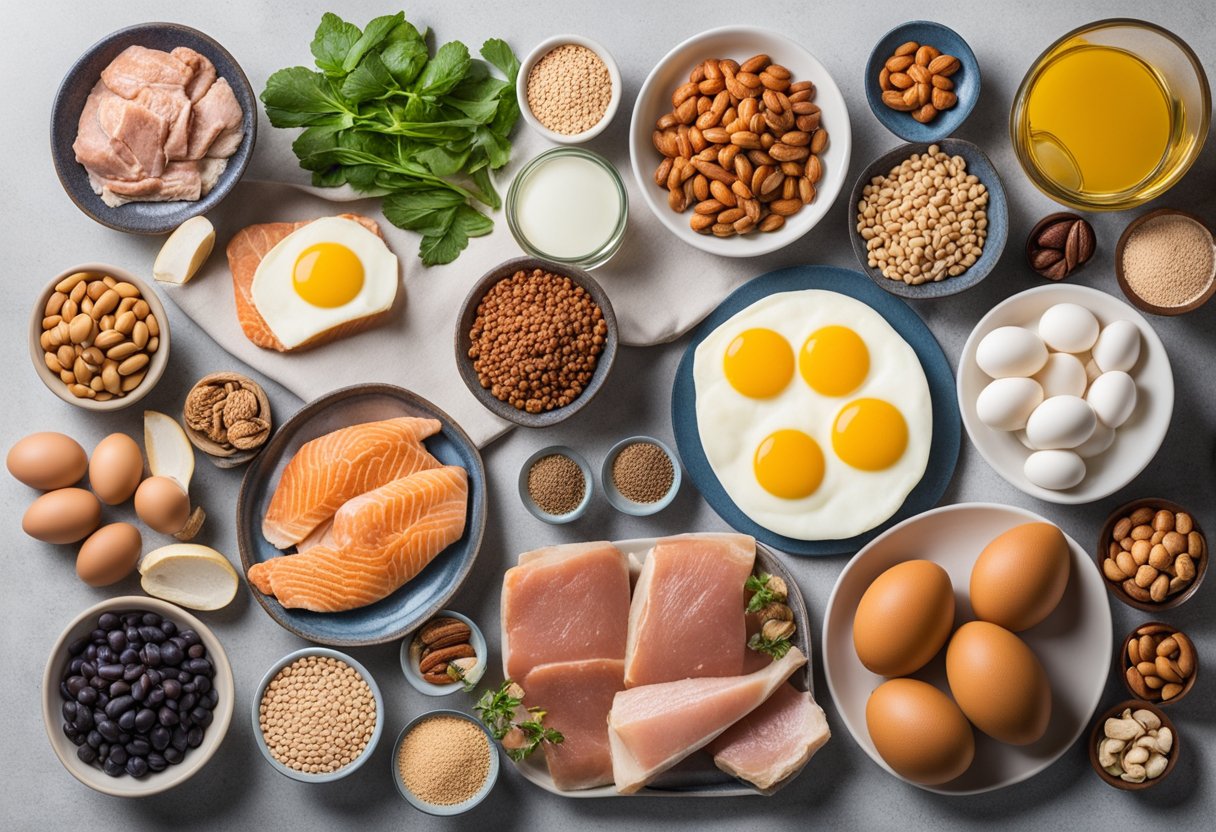
Meal planning and preparation can be challenging but worth the effort.
Incorporating healthy proteins into my diet helped me maintain energy levels and stay physically active.
Whether you enjoy a plate of grilled chicken or add a spoonful of peanut butter to your morning smoothie, small choices add up to significant benefits.
Reading food labels and choosing supplements wisely can make a difference, too.
Look for foods that provide high-quality protein and avoid those high in unhealthy fats and sugars.
By making informed dietary choices, you support your recovery and improve your overall wellness.
Key Takeaways
- Protein rebuilds muscle lost during cancer treatment.
- Choose lean meats, beans, and dairy for protein intake.
- Understand food labels to make healthier choices.
Understanding Protein in Nutrition
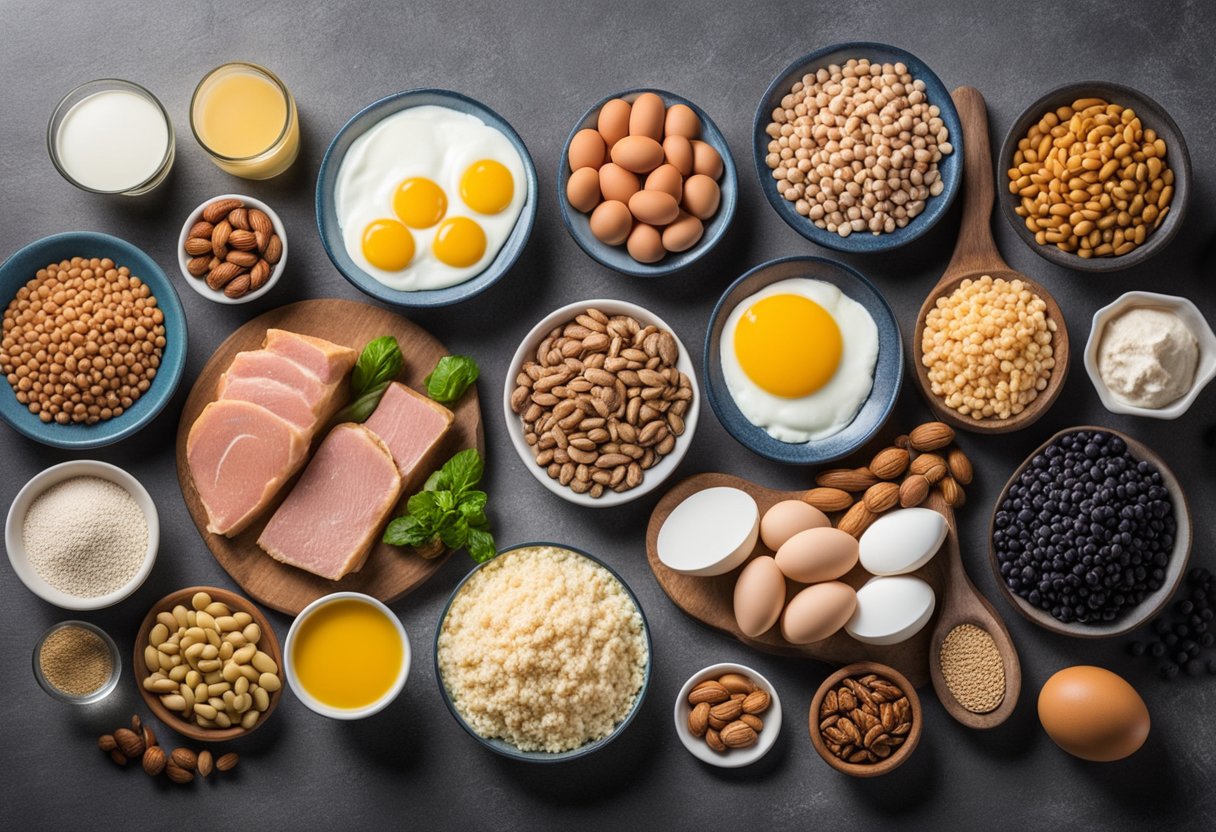
A protein-rich diet is essential for cancer survivors to help prevent or slow down muscle wasting.
Adequate protein intake helps maintain and rebuild muscle mass, often lost during cancer treatment.
Discussing the importance of protein and providing examples of protein-rich foods can help survivors make informed dietary choices.
The Role of Protein in Healing and Repair
Protein plays a critical part in healing and repair after cancer treatments.
When I went through chemotherapy, I learned how my body needed nutrients to recover.
Protein helps build and repair tissues, which is vital when dealing with cells damaged by treatment.
It also supports the immune system, helping the body fight infections.
Including enough protein in your diet ensures that muscles don’t waste away during treatment, helping maintain strength and energy.
Cancer treatments like chemotherapy can break down muscle, making protein intake even more essential.
Incorporating foods such as chicken, fish, and legumes can support your body’s healing process.
Recommended Protein Intake for Thrivers
Knowing how much protein to consume is vital to maintaining health.
Dietitians usually suggest around 1.2 to 2 grams of protein per kilogram of body weight.
This range helps tailor protein intake to individual needs.
My dietitian emphasized eating enough protein when I was under treatment to maintain my muscle mass and energy levels.
Different stages of treatment may require adjustments in protein intake.
Listening to your healthcare providers and possibly adjusting your diet as you progress through treatments can yield the best outcomes.
Measuring protein can be made easier with nutrient-rich snacks like Greek yogurt, nuts, and protein shakes.
Sources and Types of Dietary Protein
Various sources of protein can be included in your diet.
I found that mixing plant- and animal-based proteins helped get a balanced nutrient mix.
Protein-rich foods include lean meats, fish, eggs, dairy products, legumes, and nuts.
Try eating tofu, beans, lentils, and quinoa for plant-based options.
These plants provide necessary nutrients without the saturated fats found in some animal proteins.
I always paired my meals with vegetables to ensure a balanced intake.
Understanding the types of proteins and their benefits can make it easier to plan meals and stay healthy.
Optimal Diet for Cancer Survivors
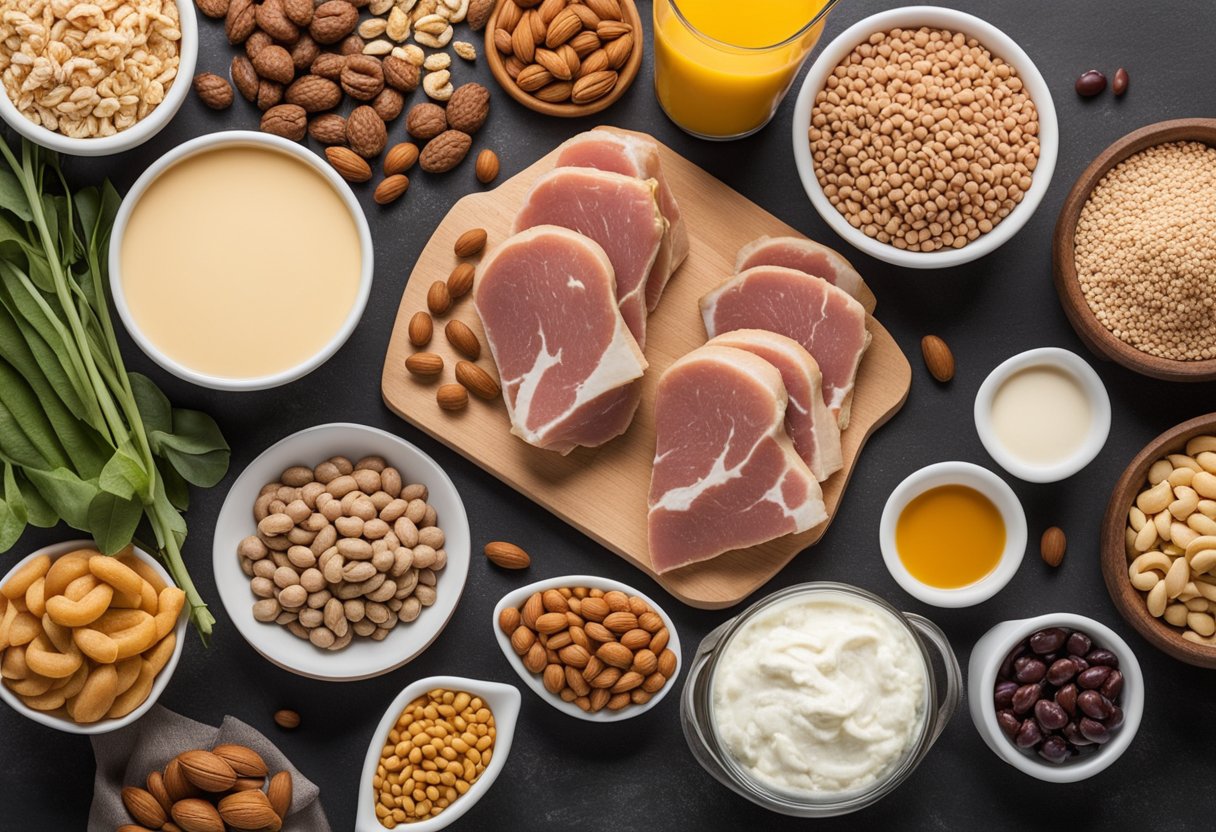
An optimal diet for cancer survivors can promote overall health, reduce cancer recurrence risk, and aid in recovery.
During and after treatment, focusing on balanced meals rich in nutrients is vital.
The Importance of a Balanced Diet
A balanced diet is crucial for cancer survivors. It helps sustain energy, promote healing, and maintain muscle mass.
Including vegetables, fruits, and whole grains provides essential vitamins and minerals.
Prostate cancer treatment may lead to muscle loss, so it’s key to include protein-rich foods like lean meats, eggs, and beans.
A diet like this can improve the way you feel and help you maintain a healthy weight.
This is crucial, especially after treatments like chemotherapy and radiation therapy. A varied diet also ensures that you get a wide range of nutrients.
Addressing Nutritional Needs During and After Treatment
Cancer treatments can affect appetite, digestion, and nutrient absorption.
It’s vital to meet the body’s heightened nutritional needs during this time.
High-protein foods aid in repairing tissues and maintaining strength.
Snacking on nuts, seeds, and yogurt helped between meals.
The goal is to eat smaller, frequent meals to stabilize energy levels.
Hydration is another aspect to consider.
Drinking enough water helps manage treatment side effects like dry mouth and constipation.
Cancer survivors should also avoid processed foods high in sugar and fat.
It’s beneficial to choose a diet plan tailored to individual needs, perhaps with the help of a nutritionist.
Foods to Include and Avoid in a Thriving Diet
In your diet, focus on whole food choices.
Incorporate colorful fruits and vegetables as they provide antioxidants that protect cells.
Whole grains like brown rice and quinoa add fiber, while beans and nuts offer plant-based proteins.
Limit or avoid foods high in sugar, as they can lead to weight gain, raising cancer recurrence risk.
It’s also wise to reduce the intake of red and processed meats.
Alcohol should be consumed in moderation, no more than two drinks a day for men.
Incorporating Healthy Proteins
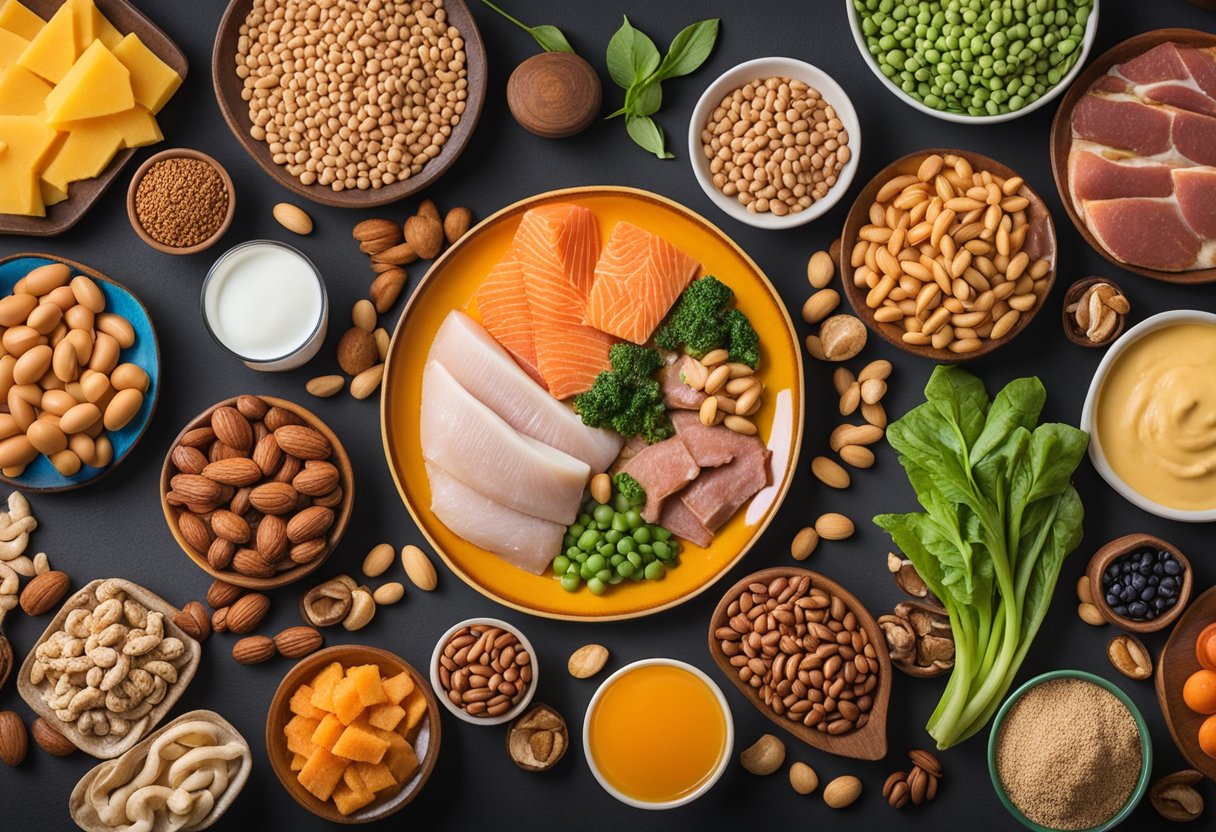
Eating protein-rich foods is crucial for preventing muscle loss, especially for male cancer thrivers who have undergone treatment. Here are some specific types of proteins and how they can be part of your meals.
Animal vs. Plant-Based Proteins
I found both animal and plant-based proteins valuable in my diet.
Animal proteins like chicken, fish, eggs, and red meat offer all essential amino acids.
These options are complete proteins that help rebuild muscle.
On the other hand, plant-based proteins like tofu, lentils, and beans are rich in nutrients.
Though they may not provide all essential amino acids in one go, combining them can create a complete protein profile.
For instance, pairing beans and rice can effectively get a full range of amino acids.
High-Protein Foods for Everyday Meals
I focus on incorporating a variety of protein-rich foods into my daily meals. Here are some staples:
- Eggs: A simple breakfast staple that packs about 6 grams of protein per egg.
- Chicken breast: A lean source of protein, perfect for lunch or dinner, with around 31 grams of protein per 100 grams.
- Fish: Like salmon, which provides about 20 grams of protein per 100 grams and is rich in omega-3 fatty acids.
- Nuts and seeds: Almonds and chia seeds are convenient snacks, offering protein and healthy fats.
- Dairy: Items like Greek yogurt and cottage cheese are protein-rich and can be incorporated into smoothies or salads.
Proteins That Assist in Immune System Support
Proteins also play a role in supporting the immune system.
Whey protein is particularly effective in boosting immunity.
Studies highlight its benefits, including its influence on leucine and glutamine pathways.
Incorporating legumes like lentils and beans introduces essential nutrients that support immune function.
Seafood is another exceptional source rich in amino acids and minerals, aiding overall health.
Strategies for Weight Management
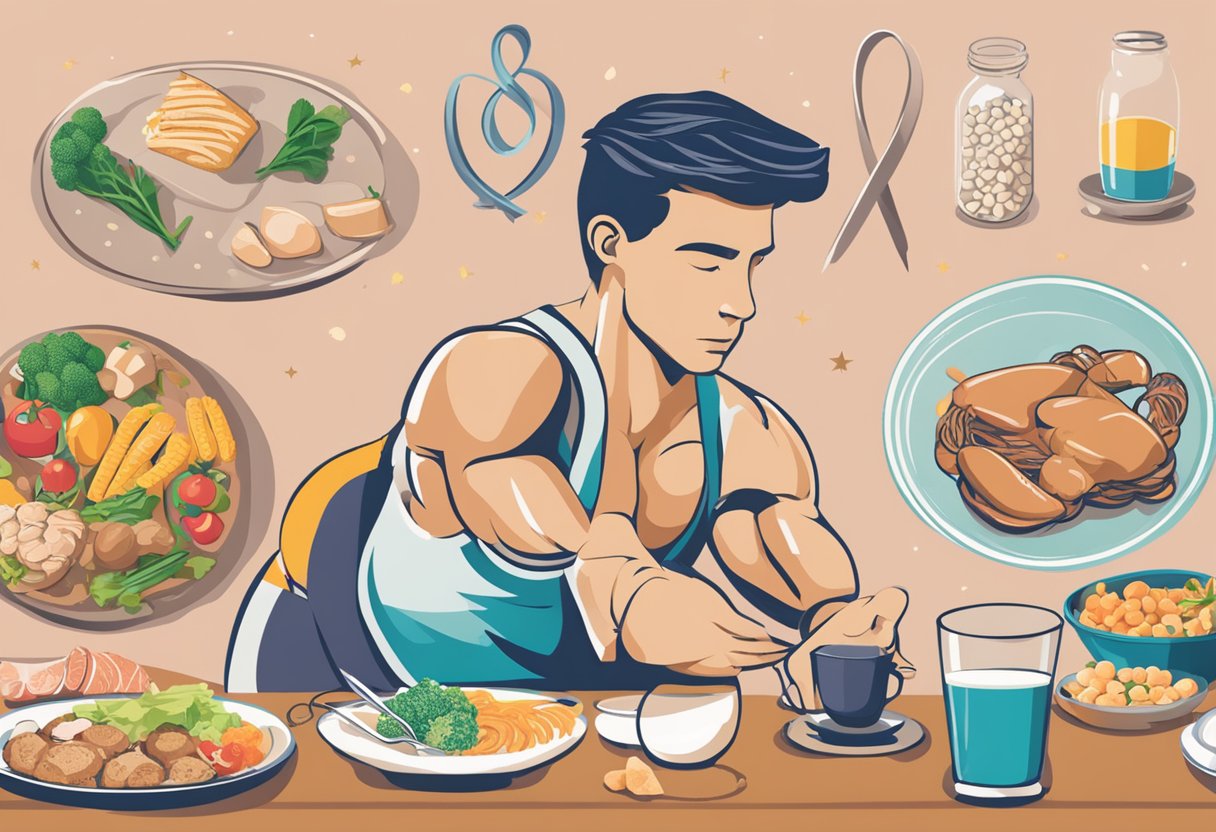
Managing weight effectively is vital for male cancer thrivers like myself. It involves a protein-rich diet to maintain muscle mass, being mindful of metabolism changes, and adjusting dietary intake post-treatment.
Maintaining a Healthy Weight with Protein
Consuming plenty of protein helps keep muscles intact.
During my treatment, I made sure to eat lean meats, fish, eggs, and dairy.
These foods help with muscle repair and growth.
Staying within a healthy weight range reduces the risk of cancer recurrence.
For example, eating chicken breast, beans, and legumes provides a solid protein foundation.
Protein shakes can also be helpful, especially when eating is challenging.
This approach has helped me stay active and maintain my strength.
Muscle Preservation and Metabolism
Cancer treatment often takes a toll on muscle tissues.
Focusing on exercises that help preserve muscle mass and boost metabolism is essential.
Regular resistance training and lightweight lifting made a significant difference.
Walking, swimming, and yoga also helped improve my overall energy levels.
Keeping my muscles strong sped up my recovery and kept my metabolism steady.
Eating sufficient protein supports these exercises and helps the body rebuild muscle tissues efficiently.
Adjusting Dietary Intake Post-Treatment
Dietary needs change after treatment.
Adjusting intake according to new energy levels and any lingering side effects is crucial.
I began with smaller, more frequent meals to avoid feeling overwhelmed. This also helped maintain balanced energy levels throughout the day.
Focusing on nutrient-rich foods like fruits, vegetables, whole grains, and lean proteins supports overall health and helps manage weight.
Avoiding processed foods and sugary snacks helped me feel better and manage my weight more effectively.
Understanding Food Labels and Supplements
Navigating food labels and selecting the right protein supplements can help male cancer survivors maintain muscle mass. Consulting a registered dietitian ensures that dietary choices promote health and recovery.
Reading Nutrition Labels for Better Choices
Reading nutrition labels helps me choose healthier options. Making sense of these labels ensures I get the nutrients needed to thrive.
For example, protein content is critical, especially after cancer treatments. Labels provide details on how much protein, fats, and sugars are in each serving, making product comparisons easier.
I prioritize foods rich in protein, such as nuts, seeds, and lean meats. Nuts and seeds offer protein and essential fats that support overall health.
It’s also vital to pay attention to portion sizes on labels. This prevents overeating or underestimating intake. Choosing products with minimal added sugars and unhealthy fats further supports my recovery.
The Role and Selection of Protein Supplements
After lymphoma, protein supplements became a staple in my diet. Protein supplements, like protein powder or drinks such as Ensure, help meet daily protein needs. They are convenient sources of high-quality protein.
In my experience, whey protein powders mix easily with smoothies or oatmeal, enhancing my meals without much effort.
Selecting the right supplement requires reading labels carefully. I look for those with minimal additives and high protein content per serving.
Some supplements also offer additional vitamins and minerals, contributing to overall nutrition. Supplements like Ensure are beneficial, providing balanced nutrition along with protein.
Consulting with a Registered Dietitian
Working with a registered dietitian transformed my dietary habits. Dietitians tailor dietary plans based on individual health needs and preferences. They guide me on proper protein intake and the best sources.
This personalized approach ensures optimal recovery and health maintenance.
Dietitians can suggest a variety of protein-rich foods and help incorporate them into daily meals. They also provide advice on choosing appropriate supplements and avoiding excessive protein intake, which can prevent potential health issues.
Involving a professional ensures my diet remains balanced and supportive throughout my cancer recovery journey.
Meal Planning and Preparation Tips
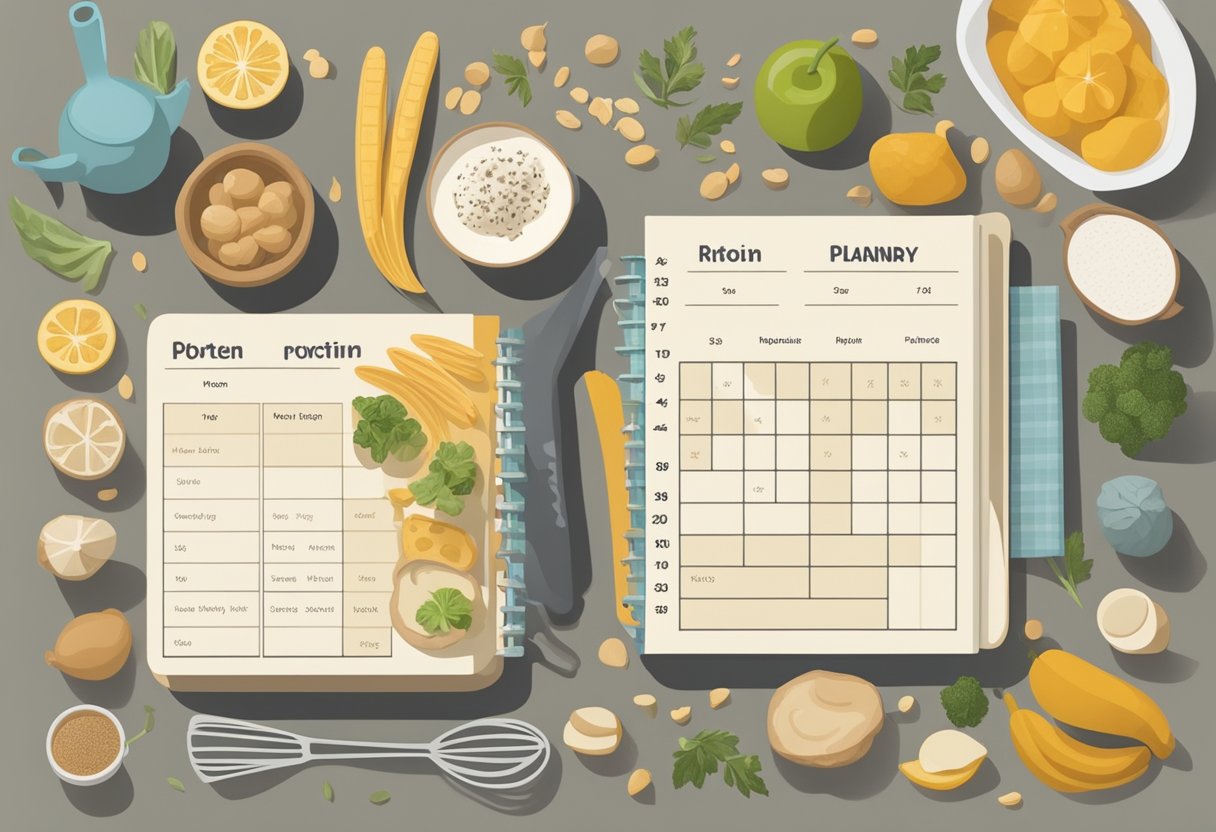
Creating satisfying and nutritious meals, cooking and prepping for convenience, and introducing innovative high-protein snacks and smoothies can help you maintain muscle mass and stay energized.
Creating Satisfying and Nutritious Meals
Balancing taste and nutrition is crucial in meal planning. I aim for meals packed with protein, whole grains, and fiber, which are key for recovery and maintaining muscle mass.
Breakfast could include Greek yogurt topped with berries and nuts. Quinoa or brown rice with grilled chicken and various colorful vegetables makes a healthy choice for lunch. Dinner can feature lean meats like turkey or beans paired with whole-grain bread or a leafy salad.
A varied diet helps me get the nutrients I need to feel my best.
Cooking and Prepping for Convenience
Convenience is critical to sticking to a healthy diet. I like to cook in batches. For instance, I prepare a large pot of lentil soup or grill several chicken breasts at once. These can be portioned and stored in the fridge or freezer.
Snacks like hard-boiled eggs or cottage cheese with fruit are easy to prep and grab. Labeling and storing food in meal-sized portions saves time and ensures I eat well, even on busy days.
Innovative High-Protein Snacks and Smoothies
Snacking smartly helps me meet my protein goals. Almonds, edamame, and jerky are excellent high-protein snacks.
I also enjoy making smoothies. I blend Greek yogurt, spinach, a banana, and protein powder for a quick, nutrient-dense drink. These smoothies are perfect when I need a quick energy boost.
Individual nuts and dried fruit portions are another convenient option to keep my nutrition on track.
Impact of Diet on Overall Wellness
A well-balanced diet enhances energy levels and lowers disease risk. Essential nutrients like healthy fats and antioxidants also support cancer care and mental health, helping manage appetite and mood.
Nutrition’s Role in Energy and Disease Prevention
Nutrition drives our vitality and boosts energy, playing a key role in disease prevention. Consuming protein-rich foods, like chicken, fish, and legumes, is especially crucial.
As a two-time lymphoma survivor, I know firsthand that adequate protein intake helps maintain muscle mass, often lost during treatment. Including whole grains in meals provides sustained energy throughout the day, which is essential for recovery.
Adding foods rich in antioxidants, such as berries and cruciferous vegetables like broccoli and cauliflower, reduces inflammation and lowers cancer risk.
Healthy Fats and Antioxidants in Cancer Care
Healthy fats and antioxidants are vital in supporting cancer care. Foods like avocados, nuts, and olive oil provide healthy fats that help the body absorb essential vitamins.
These nutrients improve cell function and immune response. Antioxidants found in fruits, vegetables, and whole grains fight inflammation and protect cells from damage.
For example, vitamin E and selenium in almonds and sunflower seeds support immune health and aid in recovery.
Mental Health Considerations and Appetite
Nutrition significantly impacts mental health and appetite. Certain foods can help manage mood swings and improve mental clarity during treatments.
Omega-3 fatty acids in fish like salmon and walnuts support brain health. High-protein diets also stabilize blood sugar levels, reducing mood fluctuations.
It’s common to lose appetite during cancer treatments. Consuming small, frequent meals and including nutrient-dense snacks like yogurt, cheese, and protein shakes can help maintain calorie intake.
Supporting mental health through diet fosters a positive outlook and aids in managing stress during recovery.
Final Thoughts
Throughout my journey of surviving lymphoma cancer twice, I’ve learned the value of a protein-rich diet for maintaining and rebuilding muscle mass. Protein consumption helps fight against muscle wasting, a common challenge faced during and after cancer treatment.
Eating enough protein can be a game changer. I relied on foods like lean meats, fish, beans, and nuts. Eggs and dairy are also great sources. These foods not only boosted my energy but also helped me regain strength.
Making informed dietary choices is crucial for us, fellow cancer thrivers. Incorporating various protein sources ensures that we get a range of nutrients. I often included a mix of plant-based and animal-based proteins in my meals.
Here is a simple list of protein-rich foods I found helpful:
- Chicken breast
- Salmon
- Tofu
- Greek yogurt
- Quinoa
Staying active combined with a protein-rich diet aided my recovery. Engaging in light exercises, like walking or yoga, alongside consuming adequate protein, supported my journey back to health.
Remember, it’s not about perfection but making consistent, healthy choices. Surround yourself with supportive people and resources. This approach made a significant difference in my life, and I can do the same for you.
The Debate
As someone who has survived lymphoma cancer twice, I understand the need for a protein-rich diet. It helps maintain muscle mass, which is often lost during treatment.
Advantages of Protein
Eating enough protein can be a game-changer. During my recovery, foods like chicken, fish, and eggs provided much-needed strength. Animal-based proteins like these are suggested to make up a large portion of one’s diet during active treatment.
Concerns About High-Protein Diets
Not everyone agrees on the benefits of a protein-rich diet for cancer patients. Some studies suggest that high-protein diets, especially those heavy in meat and dairy, may increase cancer risk. For example, Forbes points out the potential risks involved.
Protein for Muscle Anabolism
Despite the differing opinions, it’s clear that muscle anabolism is essential during recovery. Even with dietary restrictions, you can aim to include more plant-based proteins.
Beans, lentils, and nuts are excellent choices for meeting protein needs. Plant-based protein-rich diets can support muscle rebuilding, although larger quantities may be needed.
Protein Needs for Cancer Thrivers
Finding a balanced approach is vital. Incorporating both animal-based and plant-based proteins can cover all bases. I’ve found that variety in protein sources has helped me maintain my health post-treatment.
If you’re like me, navigating between these perspectives can be challenging. Be mindful of recommendations and listen to your body’s needs. Making informed dietary choices can make all the difference. -T
Frequently Asked Questions
Eating a diet high in protein assists male cancer survivors in muscle maintenance and recovery. Here’s some guidance on protein intake and cancer recovery.
How much protein should a male cancer survivor consume daily?
As a male cancer survivor, I aim for 1.2-2 grams of protein per kilogram of body weight daily. This helps rebuild muscle and supports overall health during recovery.
What are the optimal sources of protein for cancer patients?
Excellent protein sources include lean meats like chicken, fish, and turkey. Other options are plant-based proteins such as beans, lentils, and tofu. Incorporating these into meals can provide the necessary nutrients.
Can a high-protein diet positively impact male cancer recovery?
Yes, a high-protein diet can improve strength and energy levels. During my treatment, maintaining adequate protein intake greatly helped with muscle recovery and retention.
What are high-protein meal suggestions for individuals recovering from cancer?
For breakfast, I recommend Greek yogurt with berries and nuts. Lunch might include a quinoa salad with black beans. Grilled salmon with steamed vegetables is a good dinner choice. Snacks could be cottage cheese or a protein smoothie.
Are there particular proteins that cancer cells are known to utilize more effectively?
While all proteins are essential, some studies suggest that cancer cells may rely more on amino acids like glutamine. However, focusing on a balanced protein intake from varied sources aids overall health.
What are the best cancer-fighting foods that are also high in protein for men?
Broccoli, garlic, and spinach are known for their cancer-fighting properties. To enhance their effectiveness, they can be paired with high-protein foods like lean meats, eggs, and legumes.
Integrating these into a balanced diet promotes better health outcomes.
